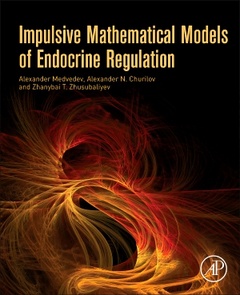Description
Impulsive Mathematical Models of Endocrine Regulation
Authors: Medvedev Alexander, Churilov Alexander, Zhusubaliyev Zhanybai T.
Language: English
Subject for Impulsive Mathematical Models of Endocrine Regulation:
Approximative price 145.45 €
In Print (Delivery period: 14 days).
Add to cart320 p. · 19.1x23.5 cm · Paperback
Description
/li>Contents
/li>Readership
/li>Biography
/li>
Impulsive Mathematical Modeling of Endocrine Regulation demonstrates recently-developed mathematical models portraying pulse-modulated regulation in endocrine systems. These constructs appear in studies of the endocrine loops that are controlled in pulsatile manner by the brain, primarily by the hypothalamus. The relatively slow dynamics of the hormone kinetics admixed with fast neural signaling are difficult to understand without computational nonlinear analysis and give rise to challenging problems in theory of hybrid systems. This book takes a pragmatic engineering stance on the problem by starting with the necessary theoretical background on the analysis tools, progressing through a number of mathematical models of increasing complexity, and illustrating the feasibility and fidelity of the mathematical constructs on actual biological data. Compared to a commonplace, theory-oriented book on dynamical systems and control which typically presents a group of design or analysis techniques, Impulsive Mathematical Modeling of Endocrine Regulation originates from a real-life problem of fundamental value and introduces mathematical tools that have specifically been devised to solve it.
- Presents results on impulsive mathematical models of endocrine regulation in a systematic, comprehensive, and accessible manner
- Introduces researchers and engineers specializing in dynamical systems to a rapidly-growing topic
- Provides biomedical engineering and biological researchers with mathematical modeling and analysis tools for continuous systems, using episodic feedback exemplified by non-basal endocrine regulation
Chapter 1: Endocrine Regulation 1.1 Biological Facts 1.2 Mathematical Mdoels Chapter 2: Mathematical Grounds 2.1 Impulsive Differential Equations 2.2 Hereditary Impulsive Differential Equations 2.3 Bifurcation Analysis of Impulsive Systems Chapter 3: Bifurcations and Nonlinear Phenomena in Impulsive Models of Endocrine Regulation 3.1 Nonlinear Phenomena in the Impulsive Goodwin’s Oscillator with Small and Without Time Delays 3.2 Quasiperiodicity, Border-Collision and Multistability in the Impulsive Goodwin’s Oscillator with a Large Time Delay 3.3 Hidden Attractors and Quasiperiodic Period-Doubling the Impulsive Goodwin’s Oscillator with an Arbitrary Time Delay 3.4 Bifurcation Phenomena and Mode-locking Dynamics for the Periodically Forced Impulsive Goodwin’s Oscillator Chapter 4: Applications 4.1 State Estimation 4.2 Parameter Estimation
Researchers in biomedical engineering, biomathematics, biomedical control, and signal processing
Alexander N. Churilov is currently a professor of Theoretical Cybernetics at St. Petersburg State University, as well as a professor of Computer Science at St. Petersburg Marine Technical University. He received his M. Sc. in Mathematics and later his Ph. D. in Mathematical Cybernetics from Leningrad State University. He also received his Doctor of Sciences in mathematical cybernetics and mathematical modeling from St. Petersburg State University. Dr. Churilov is a member of the International Physics and Control Society and the St. Petersburg Informatics and Control Society. He has published four books and hundreds of papers on mathematical modeling. His research areas include nonlinear control systems, impulsive control systems, stability, and oscillations.
Zhanybai T. Zhusubaliyev is currently a professor of Computer Science and the Head of the Nonlinear Dynamical System Group at Southwest State University. He received his M. Sc. in Computer Science and later his Ph. D. in Electrotechnical Systems from Tomsk State Politechnical University. Dr. Zhusubaliyev is a member of the International Physics and Control Society and the Italian Society for Chaos and Complexity, and als

